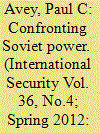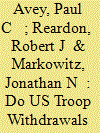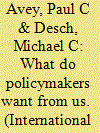| Srl | Item |
| 1 |
ID:
112471


|
|
|
|
|
| Publication |
2012.
|
| Summary/Abstract |
Many self-identified realist, liberal, and constructivist scholars contend that ideology played a critical role in generating and shaping the United States' decision to confront the Soviet Union in the early Cold War. A close look at the history reveals that these ideological arguments fail to explain key aspects of U.S. policy. Contrary to ideological explanations, the United States initially sought to cooperate with the Soviet Union, did not initially pressure communist groups outside the Soviet orbit, and later sought to engage communist groups that promised to undermine Soviet power. The U.S. decision to confront the Soviets stemmed instead from the distribution of power. U.S. policy shifted toward a confrontational approach as the balance of power in Eurasia tilted in favor of the Soviet Union. In addition, U.S. leaders tended to think and act in a manner consistent with balance of power logic. The primacy of power over ideology in U.S. policymaking-given the strong liberal tradition in the United States and the large differences between U.S. and Soviet ideology-suggests that relative power concerns are the most important factors in generating and shaping confrontational foreign policies.
|
|
|
|
|
|
|
|
|
|
|
|
|
|
|
|
| 2 |
ID:
157852


|
|
|
|
|
| Summary/Abstract |
Does withdrawing forward-deployed US troops increase instability? This question is at the heart of current grand strategy debates, yet endogeneity issues make this very difficult to answer. Put simply, stability may cause the United States to withdraw forces and lead one to incorrectly infer that withdrawals do not lead to greater instability. We suggest a research design to help alleviate this endogeneity problem. By utilizing exogenous crises that cause US troops to redeploy out of South Korea, we are able to estimate the causal effect of a withdrawal of US troops on the probability of instability. We examine several exogenous crises after the end of the Korean War that force US policymakers to rapidly redeploy US forces out of South Korea. We then examine the rate of conflict between South Korea and North Korea, and the United States and North Korea. We find that US troop withdrawals do not cause greater conflict, but withdrawals are at times associated with other behaviors, such as conventional arming, nuclear proliferation, and diplomatic initiatives that could affect the future likelihood of war.
|
|
|
|
|
|
|
|
|
|
|
|
|
|
|
|
| 3 |
ID:
158411


|
|
|
|
|
| Summary/Abstract |
What are the strategic costs of foreign-deployed nuclear weapons? Thus far, scholars have focused primarily on the possible benefits: deterring adversaries and reassuring allies. There is little scholarship on the costs side of the cost–benefit equation. This article evaluates one potential cost: that deployments generate crises. I argue that such deployments have, historically, rarely resulted in crises because few deployments generate the level of threat necessary for the target of the deployment to forcefully act. Crises are likely only in the rare situations when the deployment is to an area that the rival views as vital and the deployment threatens to embolden the deploying or host state. I examine all foreign nuclear deployments to support these claims. The results have implications for ongoing debates on the effects of nuclear weapons and US nuclear deployments abroad today.
|
|
|
|
|
|
|
|
|
|
|
|
|
|
|
|
| 4 |
ID:
182869


|
|
|
|
|
| Summary/Abstract |
PAUL C. AVEY, MICHAEL C. DESCH, ANA PETROVA, and STEVEN LLOYD WILSON analyze the degree to which blogs and other online new media disseminate scholarship to foreign policy officials. They find that policymakers visit sites as supplementary news sources, not to engage with academic findings. They also find that policymakers rate blogs and strictly online news sources as about as useful as scholarly journal articles and academic books.
|
|
|
|
|
|
|
|
|
|
|
|
|
|
|
|
| 5 |
ID:
133642


|
|
|
|
|
| Publication |
2014.
|
| Summary/Abstract |
What do the most senior national security policymakers want from international relations scholars? To answer that question, we administered a unique survey to current and former policymakers to gauge when and how they use academic social science to inform national security decision making. We find that policymakers do regularly follow academic social science research and scholarship on national security affairs, hoping to draw upon its substantive expertise. But our results call into question the direct relevance to policymakers of the most scientific approaches to international relations. And they at best seriously qualify the "trickle down" theory that basic social science research eventually influences policymakers. To be clear, we are not arguing that policymakers never find scholarship based upon the cutting-edge research techniques of social science useful. But policymakers often find contemporary scholarship less-than-helpful when it employs such methods across the board, for their own sake, and without a clear sense of how such scholarship will contribute to policymaking.
|
|
|
|
|
|
|
|
|
|
|
|
|
|
|
|
| 6 |
ID:
143740


|
|
|
|
|
| Summary/Abstract |
This article examines the role that nuclear non-use norms play in non-nuclear state decision making during confrontations with nuclear opponents. The claim that norms constrain nuclear use is one of the most important examples of norms influencing state security decisions. Many extend the claim to argue that non-nuclear weapon states realize norms constrain the nuclear opponent and therefore discount the possibility of nuclear strikes. To date there has been little effort to examine this extended claim. This article outlines the normative claims and an alternative strategic logic. It assesses the positions by examining two cases that the normative literature highlights: Egypt in 1973 and Iraq in 1990. The article finds little evidence that the non-use norm played a significant role in non-nuclear state decision making. Rather, non-nuclear state leaders took their opponents’ nuclear arsenals very seriously and sought to reduce the risks of nuclear strikes.
|
|
|
|
|
|
|
|
|
|
|
|
|
|
|
|